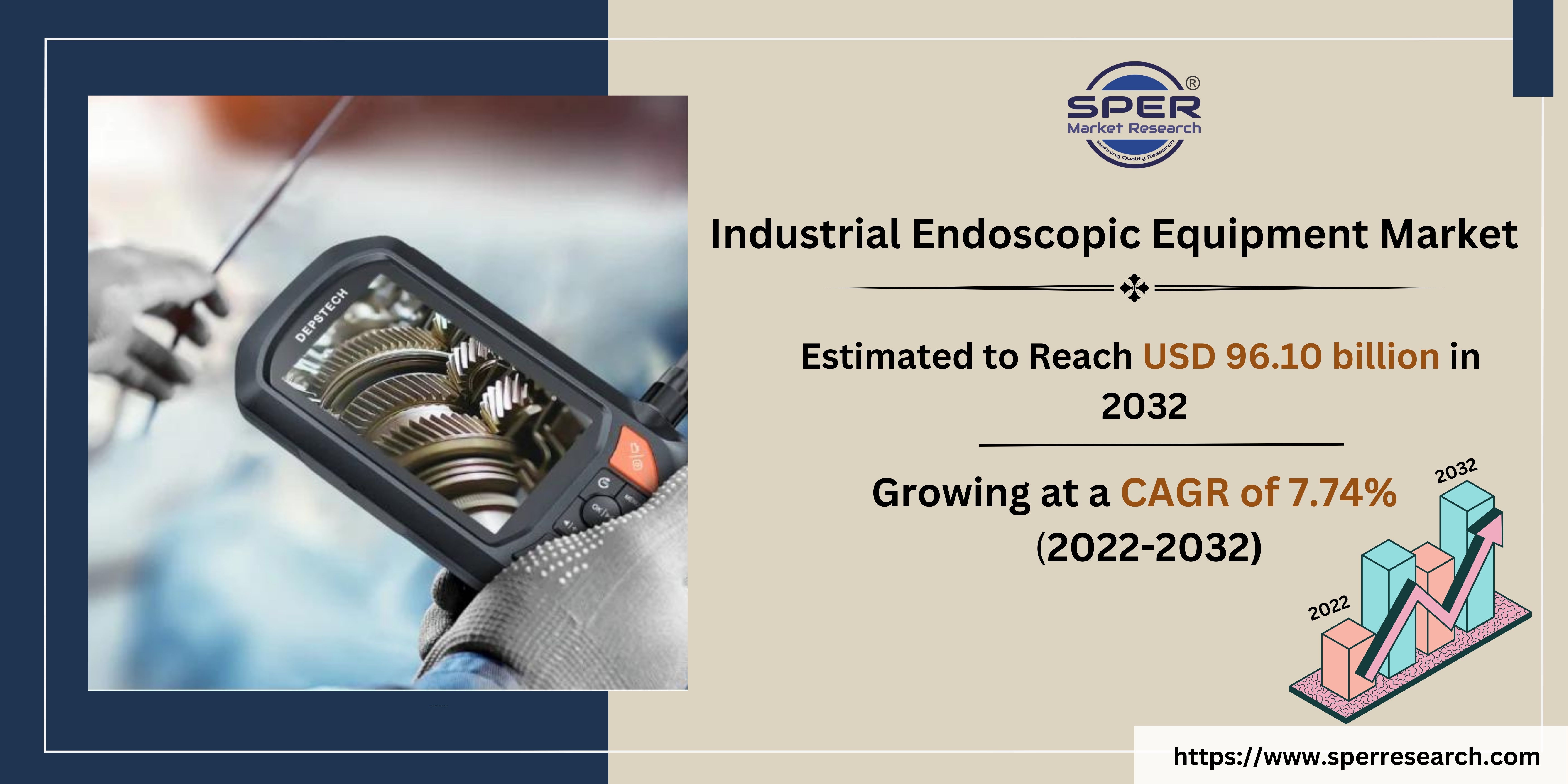
Industrial Endoscopic Equipment Market Growth, Size, Trends, Share, Revenue and Future Outlook
Industrial Endoscopic Equipment Market Size- By Application, By Accessories, By End Product, By Product Type, By Visualization System- Regional Outlook, Competitive Strategies and Segment Forecast to 2032
| Published: Mar-2023 | Report ID: MACH2304 | Pages: 1 - 242 | Formats*: |
| Category : Equipment and Machinery | |||


| Report Metric | Details |
| Market size available for years | 2019-2032 |
| Base year considered | 2021 |
| Forecast period | 2022-2032 |
| Segments covered | By Application, By Accessories, By End Users, By Product Type, By Visualization System |
| Regions covered | Asia-Pacific, Europe, Middle East and Africa, North America, Latin America |
| Companies Covered | Olympus, Fujifilm, HOYA, Karl Storz, Stryker, Endo Choice, Richard Wolf, Aohua, Johnson and Johnson |
- Arthroscopy
- Bronchoscopy
- Colonoscopy
- Laryngoscopy
- Insufflator
- Mouthpieces
- Ambulatory Settings
- ENT clinics
- Hospitals
- Flexible Endoscopes
- Hearing Screening Devices
- Rigid Endoscopes
- Recorders
- Processors
- Video Converters
- Asia-Pacific
- Europe
- Middle East & Africa
- North America
- Latin America
- Size of Global Industrial Endoscope Equipment Market (FY'2019-FY'2032)
- Overview of Global Industrial Endoscope Equipment Market
- Segmentation of Global Industrial Endoscope Equipment Market By Application (Arthroscopy, Bronchoscopy, Colonoscopy, Laryngoscopy)
- Segmentation of Global Industrial Endoscope Equipment Market By Accessories (Insufflator, Mouthpieces)
- Segmentation of Global Industrial Endoscope Equipment Market By End Users (Ambulatory Settings, ENT Clinics, Hospitals)
- Segmentation of Global Industrial Endoscope Equipment Market By Product Type (Flexible Endoscopes, Hearing Screening Devices, Rigid Endoscopes)
- Segmentation of Global Industrial Endoscope Equipment Market By Visualization System (Recorders, Processors, Video Converters)
- Statistical Snap of Global Industrial Endoscope Equipment Market
- Growth Analysis of Global Industrial Endoscope Equipment Market
- Problems and Challenges of Global Industrial Endoscope Equipment Market
- Competitive Landscape in the Global Industrial Endoscope Equipment Market
- Impact of COVID-19 and Demonetization on Global Industrial Endoscope Equipment Market
- Details on Recent Investment in Global Industrial Endoscope Equipment Market
- Competitive Analysis of Global Industrial Endoscope Equipment Market
- Major Players in the Global Industrial Endoscope Equipment Market
- SWOT Analysis of Global Industrial Endoscope Equipment Market
- Global Industrial Endoscope Equipment Market Future Outlook and Projections (FY'2019-FY'2032)
- Recommendations from Analyst
1.1. Scope of the report1.2. Market segment analysis
2.1 Research data source2.1.1 Secondary data2.1.2 Primary data2.1.3 SPER’s internal database2.1.4 Premium insight from KOL’s2.2 Market size estimation2.2.1 Top-down and Bottom-up approach2.3 Data triangulation
4.1. Driver, Restraint, Opportunity and Challenges analysis4.1.1 Drivers4.1.2 Restraints4.1.3 Opportunities4.1.4 Challenges4.2. COVID-19 Impacts on the Global Industrial Endoscope Equipment Market
5.1. SWOT analysis5.1.1 Strengths5.1.2 Weaknesses5.1.3 Opportunities5.1.4 Threats5.2. PESTEL analysis5.2.1 Political landscape5.2.2 Economic landscape5.2.3 Social landscape5.2.4 Technological landscape5.2.5 Environmental landscape5.2.6 Legal landscape5.3. PORTER’S five forces analysis5.3.1 Bargaining power of suppliers5.3.2 Bargaining power of Buyers5.3.3 Threat of Substitute5.3.4 Threat of new entrant5.3.5 Competitive rivalry5.4. Heat map analysis
6.1 Global Industrial Endoscope Equipment Manufacturing Base Distribution, Sales Area, Product Type6.2 Mergers & Acquisitions, Partnerships, Product Launch, and Collaboration in Global Industrial Endoscope Equipment Market
7.1 Arthroscopy7.2 Bronchoscopy7.3 Colonoscopy7.4 Laryngoscopy
8.1 Insufflator8.2 Mouthpieces
9.1 Ambulatory Settings9.2 ENT clinics9.3 Hospitals
10.1. Flexible Endoscopes10.2. Hearing Screening Devices10.3. Rigid Endoscopes
11.1. Recorders11.2. Processors11.3. Video Converters
12.1 Global Industrial Endoscope Equipment Market Size and Market Share by Region (2019-2025)12.2 Global Industrial Endoscope Equipment Market Size and Market Share by Region (2026-2032)12.3 Asia pacific12.3.1 Australia12.3.2 China12.3.3 India12.3.4 Japan12.3.5 South Korea12.3.6 Rest of Asia-Pacific12.4 Europe12.4.1. France12.4.2. Germany12.4.3. Italy12.4.4. Spain12.4.5. United Kingdom12.4.6. Rest of Europe12.5 Middle East and Africa12.5.1. Kingdom of Saudi Arabia12.5.2. United Arab Emirates12.5.3. Rest of Middle East & Africa12.6 North America12.6.1 Canada12.6.2 Mexico12.6.3 United State12.7 Latin America12.7.1. Argentina12.7.2. Brazil12.7.3. Rest of Latin America
13.1. Aohua13.1.1. Company details13.1.2. Financial outlook13.1.3. Product summary13.1.4. Recent development13.2. Endochoice13.2.1. Company details13.2.2. Financial outlook13.2.3. Product summary13.2.4. Recent development13.3. Fujifilm13.3.1. Company details13.3.2. Financial outlook13.3.3. Product summary13.3.4. Recent development13.4 Hoya13.4.1. Company details13.4.2. Financial outlook13.4.3. Product summary13.4.4. Recent developments13.5. Johnson and Johnson13.5.1. Company details13.5.2. Financial outlook13.5.3. Product summary13.5.4. Recent developments13.6 Karl storz13.6.1. Company details13.6.2. Financial outlook13.6.3. Product summary13.6.4. Recent developments13.7 Olympus13.7.1. Company details13.7.2. Financial outlook13.7.3. Product summary13.7.4. Recent developments13.8 Richard wolf13.8.1. Company details13.8.2. Financial outlook13.8.3. Product summary13.8.4. Recent developments13.9 Stryker13.9.1. Company details13.9.2. Financial outlook13.9.3. Product summary13.9.4. Recent developments
SPER Market Research’s methodology uses great emphasis on primary research to ensure that the market intelligence insights are up to date, reliable and accurate. Primary interviews are done with players involved in each phase of a supply chain to analyze the market forecasting. The secondary research method is used to help you fully understand how the future markets and the spending patterns look likes.
The report is based on in-depth qualitative and quantitative analysis of the Product Market. The quantitative analysis involves the application of various projection and sampling techniques. The qualitative analysis involves primary interviews, surveys, and vendor briefings. The data gathered as a result of these processes are validated through experts opinion. Our research methodology entails an ideal mixture of primary and secondary initiatives.



Frequently Asked Questions About This Report
PLACE AN ORDER
Year End Discount
Sample Report
Pre-Purchase Inquiry
NEED CUSTOMIZATION?
Request CustomizationCALL OR EMAIL US
100% Secure Payment






Related Reports
Our Global Clients
Our data-driven insights have influenced the strategy of 200+ reputed companies across the globe.




















